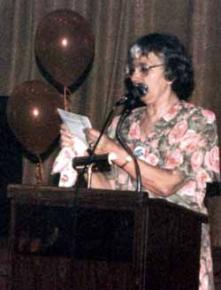A fighting “union maid”
looks back at the life of a pioneering woman socialist who was on the forefront of labor organizing in the 1930s and 1940s.
VICKY STARR, a union organizer, socialist and mother of four, died on Thanksgiving Day at the age of 93, at Evanston Hospital north of Chicago.
Vicky gained a measure of fame as one of the three "stars" in the 1977 documentary film Union Maids, which was nominated for an academy award in 1978.
In the film, Vicky used the alias Stella Nowicki, a name picked for a 1969 interview with Alice and Staughton Lynd in their book Rank and File, which inspired the filmmakers. Vicky's association with the Communist Party in the 1930s still weighed heavy on many of the activists of that period long after McCarthyism was laid to rest. Her story, told in the book and the film, remains an inspiration to anyone interested in labor's cause.
The daughter of a coal miner, Vicky had union in her blood. At age 17, she became a "colonizer"--an underground union organizer--in a meatpacking plant in Chicago. One of her toughest jobs was in the glue-rendering department of a large plant. She recalled being so sore from a day's work of handling large bones that she would often fall into bed without supper.

The meatpacking industry had defeated unionizing efforts twice before, and had a reputation for being a tough place to organize, let alone stand up to the work. Hours were long and wages meager in 1933.
After many jobs in several plants over seven years, Vicky finally joined her union brothers and sisters in achieving bargaining rights at two key plants in Chicago's Back of the Yards. As a leading activist in the United Packinghouse Workers of America, Vicky helped negotiate contracts for thousands of workers.
Vicky left meatpacking in 1945. She returned to salaried work as a secretary in 1963 and helped organize Teamsters Local 743 to represent administrative staff at the University of Chicago. She was the first shop steward for the local.
Retirement didn't slow Vicky down. She was an ardent bridge player and also an inspirational speaker for a new generation of activists. She was often featured at May Day events in the 1980s and '90s, and spoke several times at events organized by the International Socialist Organization.
In her speeches to a new generation of socialists, Vicky brought to life the struggles that younger militants had only read about in history books. She spoke about the special challenges faced by women workers in the plant enduring sexism from supervisors. She also described how union organizers took on racism--and recalled with delight how Polish immigrant workers were amazed to find that an African American union militant could speak to them in their own language.
Vicki also explained why she continued to go by the name "Stella Nowicki" from the film Union Maids: At the time the film was made in the mid-1970s, she was once again an "underground" organizer--this time at the University of Chicago.
To those of us who met her in her later years, she was able to provide a living and inspiring link to the past. Vicky once told an interviewer how important it was for her, as a young woman, to meet the elderly Lucy Parsons, widow of Haymarket martyr Albert Parsons, because Lucy represented labor's best fighting traditions.
Those of us lucky enough to have met Vicky feel the same way. Vicky's story--recorded in the Lynds' book and dramatized in the film--should not be missed.


